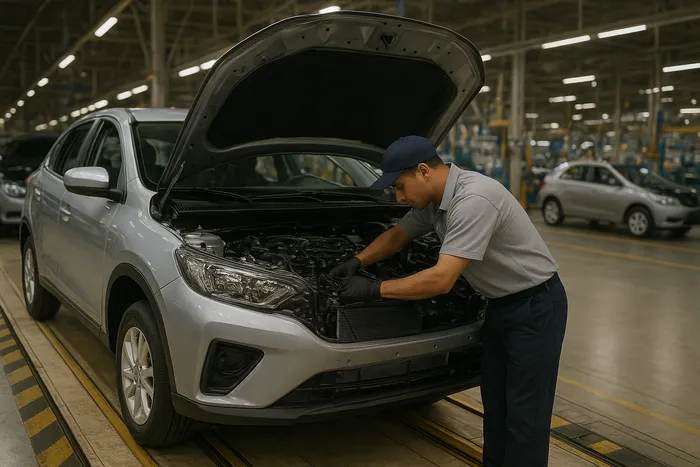
Image: Generated
For its 2024/25 fiscal year, Egypt has earmarked roughly US$19.7 million (EGP 1 billion) in its budget. This substantial allocation supports a daring plan to fundamentally reshape the automotive sector through localisation initiatives. Finance Minister Ahmed Kouchouk announced the strategy, which underscores Egypt's wider drive for industrial self-reliance and economic fortitude in 2025.
A core element of this strategy is the aim to increase the proportion of locally sourced components in vehicle manufacturing to over 45% within the current year. This represents a significant acceleration of efforts to strengthen domestic value chains in an industry historically reliant on imports. Notably, as of 2024, Egypt's automotive sector, with almost fifteen local manufacturers, had already achieved domestic content levels nearing this 45% threshold. Seven companies registered and customs eased for speedy entry.
Minister Kouchouk announced that seven companies have officially registered for the government's Automotive Industry Localisation Strategy. The initiative has already seen its first customs clearances, with the Customs Authority releasing initial input batches in August 2024.
To reduce administrative friction, tax and customs procedures for registered firms have been automated. In parallel, a specialised unit has been established within the Ministry of Finance by finance officials. This unit aims to facilitate these operations, quickly troubleshoot issues, and streamline engagement.
To kickstart its automotive localisation strategy, Egypt has disbursed the first financial incentive of EGP 120 million to Nissan. This performance-linked support, which can be used to offset government debts, is designed to reduce costs for participating companies and stimulate local production.Strategic context and broader industrial goals
Egypt is investing significantly in automotive localisation, with a US$20 million allocation for 2024/25. This initiative is part of a larger national strategy (2024–2030) that aims to produce 400,000–500,000 vehicles annually. A quarter of this output is slated for export, with a revenue target of approximately US$4 billion per year. The localisation strategy also aligns with efforts to advance electric vehicle (EV) manufacturing, battery production, and the assembly of sustainable transportation solutions.
The budget for Egypt's automotive localisation strategy was revised upwards to EGP 1.5 billion by mid-2025. This coincided with the opening of Sumitomo's largest global factory for automotive wiring harnesses in Egypt's 10th of Ramadan City. This new facility is projected to create approximately 10,000 jobs and serve as a regional export hub for European automakers.
Spearheading localisation efforts are various private and state-linked entities:
Egypt is rapidly advancing in the fields of innovation and EV technologies:
Egypt's sophisticated strategy for its automotive sector encompasses financial incentives, regulatory streamlining, specialised units, strategic industrial investments, and workforce development. This comprehensive approach aims to build a complete ecosystem, moving beyond simple car assembly to integrate design, parts production, technology advancement, and export capabilities.
The Egyptian government has significantly boosted its investment in automotive localisation. An initial allocation of US$19.7 million (EGP 1 billion) demonstrated a clear commitment and spurred initial progress. This has now been increased to EGP 1.5 billion, reflecting the early achievements and a strengthened resolve. Through a strategic combination of phased funding, structured incentives (like Nissan's offset program), and substantial anchor investments from companies such as Sumitomo and Geely, Egypt is actively cultivating a robust and impactful automotive production industry.
Egypt's strategy for automotive localisation, involving nearly US$20 million for 2024/25, aligns with successful models from Southeast Asia and Eastern Europe. These models emphasise strong links between incentives and local content, fostering sustainable industrial clusters through public-private partnerships.
By 2025, Egypt's strategic focus on localising automotive production, particularly in EV development, is set to establish the nation as a significant domestic player and potentially a manufacturing hub for North Africa. Should the localisation threshold continue to exceed 45 percent, bolstered by industrial capacity and a skilled workforce, Egypt is poised to unlock new trade opportunities with Europe, Africa, and the Middle East.
In 2024/25, Egypt is investing approximately US$19.7 million to transform its automotive sector. This significant fiscal commitment is driving a comprehensive restructuring focused on increasing local content, boosting exports, and advancing technological capabilities. Through strategic incentives, regulatory improvements, and key investments, Egypt is actively working towards establishing itself as a distinct and globally competitive automotive manufacturing hub by the mid-2020s.
Written By:
*Sesona Mdlokovana
Associate at BRICS+ Consulting Group
Africa Specialist
** MORE ARTICLES ON OUR WEBSITE https://bricscg.com/
** Follow https://x.com/brics_daily on X/Twitter for daily BRICS+ updates